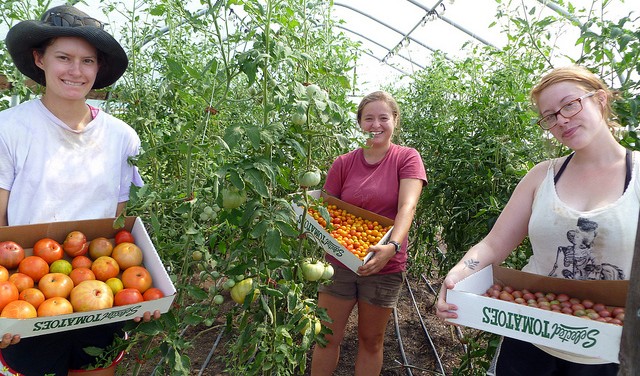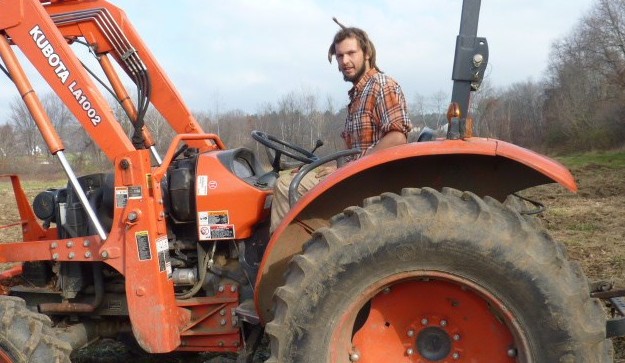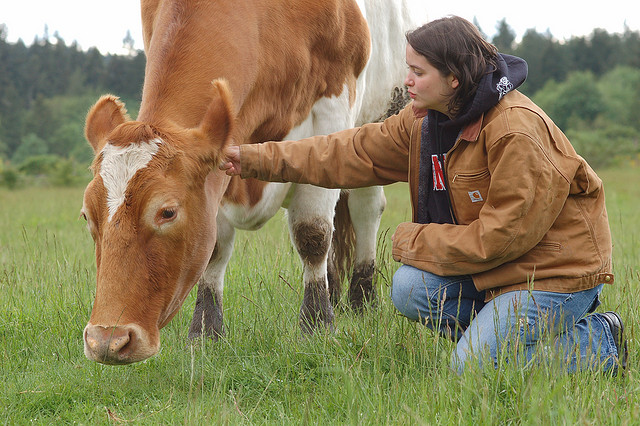By Matthew Myers
Vermont farmers have been in the news lately for violating complicated labor laws that exempt agricultural labor from certain standards, but not other farm activities, like processing milk into cheese. Since the VT Department of Labor began investigating agricultural labor in 2013, many farmers have paid fines and back wages to remedy the violations. Interestingly, these same laws apply to students from UVM and elsewhere seeking agricultural skills through a longstanding real-world learning model: internships.

Many may be surprised that learning how to farm without getting paid can be illegal. As a result of recent actions by the U.S. Department of Labor, many Vermont food system businesses have paid back wages to unpaid interns who worked in their businesses. The federal Fair Labor Standards Act (FLSA) was created in 1938 to protect workers from exploitation, but does this mean that an inexperienced student seeking agricultural skills must be paid minimum wage on the farm, even if they have very few skills and require a great deal of training?
The answer may be ‘Yes!” according to Fact Sheet #71 of the U.S. Department of Labor’s Wage and Hour Division. This set of six criteria, among other stipulations, requires that for an internship to be legal, “The employer that provides the training derives no immediate advantage from the activities of the intern; and on occasion its operations may actually be impeded.” This limited definition seems to fly in the face of common sense. How can a student learn if not given tasks where she can be productive and engaged? Why would a producer pay for an unproductive worker?
According to a report by the Vermont Sustainable Jobs Fund, “Food entrepreneurs have added at least 2,220 new jobs and at least 199 new businesses to the Vermont economy since 2009.” Who will be prepared to fill these jobs in the future if internships are illegal? Fact Sheet #71 makes the caveat that unpaid internships in the public and non-profit sectors are “generally permissible. This leaves for-profit business, including farms, the most vulnerable when hosting an intern.

Although these laws are not new, enforcement on farms has increased recently. And while a few complex legal exemptions may allow for unpaid workers in certain circumstances, the way the federal labor department is enforcing the internship guidelines effectively prohibits unpaid internships with for-profit businesses (including farms), even if a student is receiving academic credit for their experience.
Of course, labor laws are necessary to prevent exploitation of workers. We need laws that prohibit employers from labeling skilled laborers as “interns” in order to justify unfair compensation. But it is critical to consider what is at stake here: the question of how students gain the skills they need to succeed in their careers. Reports from interns in the past are strong testimony to the importance of hands-on learning in workforce preparation. One Vermont student who participated in a farm-based internship program noted, “I truly believe that I learned more pertinent information through this internship than I have learned in any, perhaps all, of my classes.” Internships can provide students an opportunity to explore career directions, bring meaning to classroom learning, acquire new skills, have an impact in the real world, establish career networks and mentors, and learn about job preferences and skills.
The value of internships is well recognized by the National Association of Colleges and Employers (NACE). NACE takes the position that “advantage to the employer” is appropriate and should be allowed as long as the internship “advances the education of the student.” They offer an alternative set of guidelines to ensure this is the case. According to NACE, a legitimate internship should “be an extension of the classroom;” allow for transferability of skills to other types of employment; have a beginning and end point defined by a detailed position description with clear academic goals; be supervised by a professional with expertise who provides routine feedback; and be supported with the resources and facilities necessary to do the job. Academic institutions can set standards (for example, requiring that internships be recognized with academic credit) to ensure that student experiences are educational rather than exploitative. If an intern is not enrolled at a university, there may be a role for the state to monitor hands-on learning outside the realm of higher education, as it does for over 25 occupations through the Vermont Registered Apprenticeship Program.

Farms and other food systems related businesses deserve the opportunity to take on interns in an environment that furthers a student’s education—and students need this hands-on learning to prepare for their careers. It is essential that we update these laws and guidelines to support internships that serve our education system, protect skilled laborers, and strengthen our economy. If you agree, consider letting our congressional delegation know how important you think this issue is to work force preparation in Vermont’s food system.
Mattnew Myers is Program Coordinator for the UVM Food Systems Internship Program, which placed UVM students from 21 different academic majors in over 80 internships in the first year of the program. Matt is a resource for UVM students seeking food systems internships and is currently welcoming food systems organizations from across the state as new internship host sites. Contact him at Matthew.Myers@uvm.edu or 802.656.0304.
Photo credits:
Organic Farm 2012 by UGA College of Ag & Environmental Sciences – OCCS via Flickr CC BY-NC 2.0
Willie ready to go again after lunch by Barbara Partee via FlickrCC BY-NC-SA 2.0
Intern Danielle by Friends of Family Farmers via Flickr CC BY-ND 2.0










